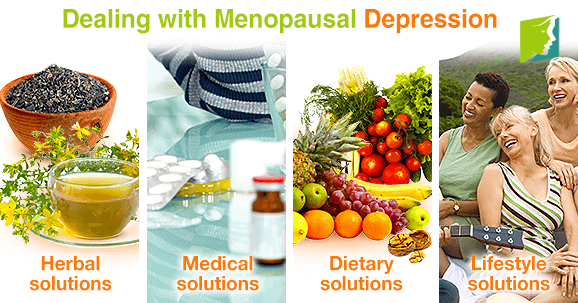Depression is not uncommon among menopausal women. It is very alarming initially because, even if you've always been stable emotionally, you may suddenly experience prolonged periods of sadness or lethargy. It can reduce your interest in your favorite things and put a damper on your relationships. However, there are a number of solutions available.
Herbal Solutions
When it comes to menopause, one way to handle your symptoms is with herbal teas or supplements. This is because menopause involves a decline in a sex hormone called estrogen. Estrogen is essential for maintaining adequate levels of neurotransmitters in the brain that induce happiness, such as serotonin and oxytocin. To balance your estrogen, you can consume black cohosh, an herb brimming with estrogen-like plant compounds called phytoestrogens.
There are also herbs that work by regulating serotonin levels on their own, such as St. John's wort. Preparations of this herb are sometimes prescribed to individuals with depression under the guidance of a physician.
Medical Solutions
Antidepressants work by correcting imbalances of neurotransmitters that affect mood. There are more than 20 different types available to suit different situations and preferences. Prescription medications are typically used alongside some form of talk therapy, such as counseling. This helps patients cope with the effects of depression while treating the underlying imbalance in brain chemistry.
Dietary Solutions
Ensure regular intake of whole grains, colorful fruits and veggies, nuts, and lean proteins. It is especially important to get enough B vitamins, vitamin D, vitamin C, and omega fatty acids either in your food or via a supplement. Those with depression typically have lower levels of these nutrients than their counterparts without the disorder.
Lifestyle Solutions
There is also the question of one's lifestyle decisions. It is important to get ample physical activity throughout your week, as this directly increases levels of the neurotransmitters serotonin, gamma-aminobutyric acid, and endorphin. Cardiovascular exercise and yoga are excellent choices for mental health. Spending time with people you like is also known to boost oxytocin levels, inducing feelings of love and support.
With better nutrient intake, physical activity, and treatment, you can attain mental wellness. It may be difficult to get yourself started on utilizing these solutions, but once you get into the rhythm, your mood will lift. Your happiness is worth the effort it takes to heal your emotions in a positive and lasting way.
Sources
- Coppen, A. & Bolander-Gouaille, C. (2005). Treatment of depression: time to consider folic acid and vitamin B12. Journal of psychopharmacology, 19(1), 59-65. Retrieved from http://www.ncbi.nlm.nih.gov/pubmed/15671130
- Craft, L.L. & Perna, F.M. (2004). The Benefits of Exercise for the Clinically Depressed. Primary Care Companion to The Journal of Clinical Psychiatry, 6(3), 104-111. Retrieved from http://www.ncbi.nlm.nih.gov/pmc/articles/PMC474733/
- Gautam, M. et al. (2012). Role of antioxidants in generalised anxiety disorder and depression. Indian Journal of Psychiatry, 54(3), 244-247. doi: 10.4103/0019-5545.102424
- Milaneschi, Y. et al. (2014). The association between low vitamin D and depressive disorders. Molecular psychiatry, 19(4), 444-451. doi: 10.1038/mp.2013.36
- National Center for Complementary and Alternative Medicine. (2013). St. John's Wort and Depression. Retrieved June 10, 2014, from http://nccam.nih.gov/health/stjohnswort/sjw-and-depression.htm




